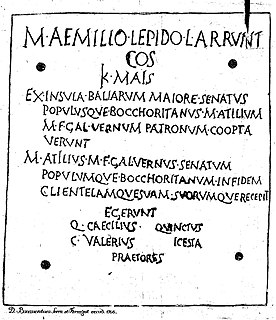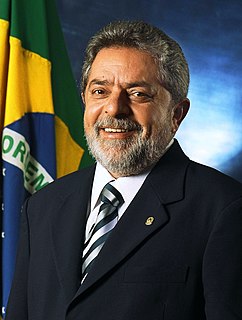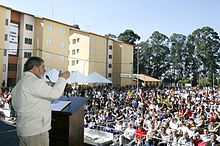
Luiz Inácio Lula da Silva, commonly known mononymously as Lula, is a Brazilian politician and former union leader who served as the 35th president of Brazil from 2003 to 2010. He was a founding member of the Workers' Party (PT) and ran unsuccessfully for president three times before achieving victory in the 2002 Brazilian general election. He was re-elected in 2006. In May 2021, Lula stated that he would run for a third term in the 2022 Brazilian general election, against the incumbent president Jair Bolsonaro.

Milk coffee politics or café com leite politics is a term that refers to the domination of Brazilian politics under the so-called Old Republic (1889–1930) by the landed gentries of São Paulo and Minas Gerais, being represented by the Paulista Republican Party (PRP) and the Minas Republican Party (PRM).

The Workers' Party is a political party in Brazil. Some scholars classify its ideology in the 21st century as social democracy, with the party shifting from a broadly socialist ideology in the 1990s. Founded in 1980, PT governed at the federal level in a coalition government with several other parties from 1 January 2003 to 31 August 2016. After the 2002 parliamentary election, PT became the largest party in the Chamber of Deputies and the largest in the Federal Senate for the first time With the highest approval rating in the history of the country, former President Luiz Inácio Lula da Silva is PT's most prominent member. His successor Dilma Rousseff, also a member of PT, took office on 1 January 2011 and was impeached in 2016.

The First Brazilian Republic or República Velha, officially the Republic of the United States of Brazil, refers to the period of Brazilian history from 1889 to 1930. The Old Republic began with the deposition of Emperor Pedro II in 1889, and ended with the Brazilian Revolution of 1930 that installed Getúlio Vargas as a new president. During the First Brazilian Republic, Brazil was dominated by a form of machine politics known as coronelism, in which the political and economic spheres were dominated by large landholders. The most powerful of such landholders were the coffee industry of São Paulo and the dairy industry of Minas Gerais. Because of the power of these two industries, the Old Republic's political system has been described as "milk coffee politics."

The Vargas Era is the period in the history of Brazil between 1930 and 1945, when the country was governed by president Getúlio Vargas. The period from 1930 to 1937 is known as the Second Brazilian Republic, and the other part of Vargas Era, from 1937 until 1946 is known as the Third Brazilian Republic.
A need is dissatisfaction at a point of time and in a given context. Needs are distinguished from wants. In the case of a need, a deficiency causes a clear adverse outcome: a dysfunction or death. In other words, a need is something required for a safe, stable and healthy life while a want is a desire, wish or aspiration. When needs or wants are backed by purchasing power, they have the potential to become economic demands.

Landless Workers' Movement is a social movement in Brazil, inspired by Marxism, generally regarded as one of the largest in Latin America with an estimated informal membership of 1.5 million across 23 of Brazil's 26 states. MST defines its goals as access to the land for poor workers through land reform in Brazil and activism around social issues that make land ownership more difficult to achieve, such as unequal income distribution, racism, sexism, and media monopolies. MST strives to achieve a self-sustainable way of life for the rural poor.
Particracy, also known as partitocracy, partitocrazia or partocracy, is a form of government in which the political parties are the primary basis of rule rather than citizens and/or individual politicians.

Eduardo Matarazzo Suplicy is a Brazilian left-wing politician, economist and professor. He is one of the founders and main political figures on the Workers Party of Brazil (PT). In the municipal elections of São Paulo in 2016 was consecrated as the most voted city councilor in the history of Brazil.

Poverty reduction, poverty relief, or poverty alleviation, is a set of measures, both economic and humanitarian, that are intended to permanently lift people out of poverty.

Fome Zero is a program of the Government of Brazil introduced by President Luiz Inácio Lula da Silva in 2003, with the goal to eradicate hunger and extreme poverty in the country.

Josué de Castro, born Josué Apolônio de Castro, was a Brazilian physician, expert on nutrition, geographer, writer, public administrator, and activist against world hunger.

Bolsa Família was a social welfare program of the Government of Brazil, part of the Fome Zero network of federal assistance programs. Bolsa Família provided financial aid to poor Brazilian families. In order to be eligible, families had to ensure that children attend school and get vaccinated. If they exceeded the total of permitted school absences, they were dropped from the program and their funds were suspended. The program attempted to both reduce short-term poverty by direct cash transfers and fight long-term poverty by increasing human capital among the poor through conditional cash transfers. It also worked to give free education to children who couldn't afford to go to school, to show the importance of education. In 2008, The Economist described Bolsa Família as an "anti-poverty scheme invented in Latin America [which] is winning converts worldwide." The program was a centerpiece of former president Luiz Inácio Lula da Silva's social policy and is reputed to have played a role in his victory in the general election of 2006. Bolsa Família was the largest conditional cash transfer program in the world, though the Mexican Oportunidades was the first nationwide program of this kind.

The term social apartheid has been used to describe various aspects of economic inequality in Brazil, drawing a parallel with the legally enforced separation of whites and blacks in South African society for several decades during the 20th-century apartheid regime.

Ignácio de Loyola Brandão is a Brazilian writer, perhaps best known as the author of the dystopian science-fiction novel Zero; the story of Brazil in the 1960s under a totalitarian regime. In 2008, he was awarded the Prêmio Jabuti for his novel O Menino que Vendia Palavras.
Clientelism or client politics is the exchange of goods and services for political support, often involving an implicit or explicit quid-pro-quo. It is closely related to patronage politics and vote buying. Clientelism involves an asymmetric relationship between groups of political actors described as patrons, brokers, and clients. In client politics an organized minority or interest group benefits at the expense of the public. Client politics may have a strong interaction with the dynamics of identity politics. This is particularly common in a pluralist system, such as in the United States, where minorities can have considerable power shaping public policy. The opposite of client politics is 'entrepreneurial' politics, or conviction politics.

José Graziano da Silva is a Brazilian American agronomist and writer. As a scholar, he has authored several books about the problems of agriculture in Brazil. Between 2003 and 2004, Graziano served in the Luiz Inácio Lula da Silva cabinet as Extraordinary Minister for Food Security, being responsible for implementing the Fome Zero program, which was a focal point of the Lula Administration's cash transfer program Bolsa Familia. On June 26, 2011, Graziano was elected director-general of the Food and Agriculture Organization (FAO), becoming the first Latin American ever to hold the position. After his first term from 1 January 2012 to 31 July 2015, Graziano da Silva was re-elected for a second 4 year-term during FAO's 39th Conference.

Patronage (clientela) was the distinctive relationship in ancient Roman society between the patronus ("patron") and their cliens ("client"). The relationship was hierarchical, but obligations were mutual. The patron was the protector, sponsor, and benefactor of the client; the technical term for this protection was patrocinium. Although typically the client was of inferior social class, a patron and client might even hold the same social rank, but the former would possess greater wealth, power, or prestige that enabled him to help or do favors for the client. From the emperor at the top to the commoner at the bottom, the bonds between these groups found formal expression in legal definition of patrons' responsibilities to clients. Patronage relationship were not exclusively between two people and also existed between a general and his soldiers, a founder and colonists, and a conqueror and a dependent foreign community.

The Grande Seca, or the Brazilian drought of 1877–1878, was the largest and most devastating drought in Brazilian history. It caused the deaths of between 400,000 and 500,000 people. Of the 800,000 people who lived in the affected Northeastern region, around 120,000 migrated to the Amazon while 68,000 migrated to other parts of Brazil.

Lulism is a political ideology describing the 2006 consolidation of segments of Brazilian society previously hostile to social movements and the Workers' Party behind political forces led by President Luiz Inácio Lula da Silva. The controlled reformism and limited structural change focused on the poorest sections of society. The lower classes, who had distanced themselves from Lula, accepted his candidacy after his first term as President as the middle class turned from him. The rhetoric and praxis which united the maintenance of stability and state distributism are the origins of Lulism. While advocating socialism, Lulism aims for a 'social liberal' approach that gradually resolves the gap between the rich and the poor in a market-oriented way.



















